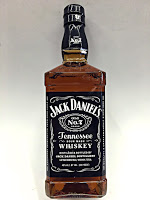
No joke, sometimes, we come across a trademark dispute that cries out for a mention. Here’s one. VIP Products (“VIP”) sells among other things a line of toys, which it calls “Silly Squeakers.” Dog lovers/readers may be familiar with them. The line of vinyl dog toys consists of vinyl replicas of liquor, beer, wine, and soda brands labeled with humorous names, usually related to dog poop. So, we have toys labeled “Smella R-Crotches”, Heini Sniff’n, Pissness, and Mountain Drool, associated with likenesses of Stella Artois beer, Heineken’s, Guinness, and Mountain Dew bottles. In 2013, VIP released a bottle in the likeness of Jack Daniels, calling it “Bad Spaniels” “43% POO BY VOL” and “100% SMELLY.”

Jack Daniels Properties, Inc. (“Jack Daniels”), owners of the renowned whisky brand, didn’t see the humor and promptly sent VIP a cease-and-desist letter. VIP wasn’t humored either and promptly sued Jack Daniels in the Federal District Court for the district of Arizona, requesting the court to make a determination that VIP was not infringing or diluting the Jack Daniels’ trademarks. Jack Daniels filed counterclaims for infringement and dilution. Trademark dilution is “the use of a mark or trade name in commerce sufficiently similar to a famous mark that by association it reduces, or is likely to reduce, the public’s perception that the famous mark signifies something unique, singular or particular.”
(Certainly, Jack Daniels predicted that VIP would sue it. VIP is no stranger to litigation. We counted more than 25 federal cases initiated by VIP in the federal court’s database. Sale of squeaky dog toys must be really good.)
Both parties then moved for summary judgment. Jack Daniels won, the court holding that Jack Daniels established the elements of infringement of its name and trade dress. One may ask, what about fair use? Well, the court rejected the notion that VIP’s toys were simply parodies. The court also held that Jack Daniels had made out a triable issue with respect to tarnishment and dilution of its trademark. There was also a four-day bench trial in which the court ruled in favor of Jack Daniels.
Undeterred, VIP appealed the court’s decision to the US Court of Appeals for the Ninth Circuit. There, VIP fared better. The Ninth Circuit — on First Amendment grounds (!) — reversed the District Court on the issues of dilution and infringement and remanded the case for further proceedings to require Jack Daniels to show that the VIP’s use of the Jack Daniels mark is either (1) “not artistically relevant to the underlying work” or (2) “explicitly misleads consumers as to the source or content of the work.” If either is demonstrated, then an action for infringement would be proper. The court wrote that
[b]ecause Bad Spaniels is an expressive work, the district court erred in finding trademark infringement without first requiring [Jack Daniels] to prove one of these elements.
With respect to tarnishment the court wrote (citations omitted)
When the use of a mark is “noncommercial,” there can be no dilution by tarnishment. Speech is noncommercial “if it does more than propose a commercial transaction,” and contains some “protected expression.” Thus, use of a mark may be “noncommercial” even if used to “sell” a product.
In the court’s eyes, VIP was conveying a humorous message, protected by the First Amendment.
For sure, Jack Daniels didn’t like this decision and in the spirit of playing hardball recently filed a Petition for Writ of Certiorari with the United States Supreme Court. In its Petition, Jack Daniels argued that “under the Ninth Circuit’s standard, virtually any “humorous” use of another’s trademark to sell a product is “noncommercial” and thus excluded from dilution liability.” It contends that it is not the law. The International Trademark Association agreed, filing an amicus brief arguing that the Ninth Circuit opinion is misguided in its application of the First Amendment to a trademark infringement dispute.
The odds of the United States Supreme Court granting certiorari are slim, but, nonetheless, there are those out there who would like to see a Supreme Court opinion that tackles the constitutionality of dog poo humor and related matters.
— Adam G. Garson, Esq.

